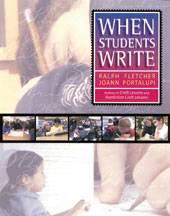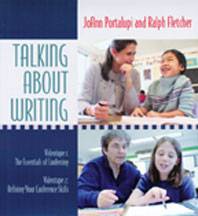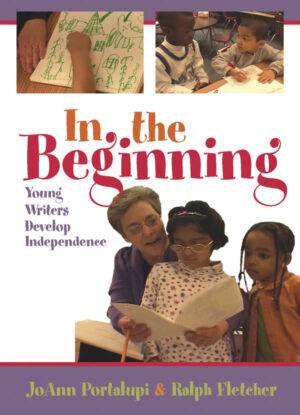Get Focused: On-Demand Writing Minilessons
by Ralph Fletcher | 23 on-demand video lessons
Grade Level: 3rd – 8th
Heinemann, 2022
Get Focused is a digital-only resource. There are no physical materials that come with it.
Explore the contents and download a sample lesson.
 Want Ralph Fletcher to teach your next writing lesson?
Want Ralph Fletcher to teach your next writing lesson?
Having trouble finding the time to plan engaging new writing minilessons? Check out Get Focused, a digital writing resource unlike anything you’ve ever seen. Cue up one of 23 on-demand video lessons and watch Ralph Fletcher teach a minilesson about the craft of writing. Then download the accompanying PDF to help your students start putting the lesson into practice in their writing.
Your next writing lesson? It’s already planned!
Teachers: having trouble finding the time to plan engaging new writing minilessons? Check out Get Focused, a digital writing resource unlike anything you’ve ever seen.
On-demand video lessons from Ralph Fletcher
Cue up one of 23 on-demand video lessons and watch Ralph Fletcher teach a minilesson about the craft of writing. Then download the accompanying PDF to help your students start putting the lesson into practice in their writing.
The student-friendly videos and PDFs are a perfect supplement to your planning and instruction. Ralph’s done all the work to get you started! He teaches minilessons on topics such as:
- Keeping a Writer’s Notebook
- Bringing your setting to life
- Taking time to revise
- Exploding a moment
- Learning from strong models
Each digital lesson is ready for you to use in your classroom tomorrow!
 When Students Write (DVD)
When Students Write (DVD)
Ralph Fletcher and JoAnn Portalupi
4 30 minute Video Tapes & Viewing Guide
You can read books or attend workshops about how to teach writing, but there’s no substitute for seeing master teachers put ideas into practice with real kids.
When Students Write takes us into the classrooms at Bailey’s Elementary School in the outskirts of Washington, DC, where teachers wrestle with the questions of what it means to become an effective writer and what is a teacher’s role in developing students’ competence as writers. The four videotapes cover all the practical components necessary for establishing and implementing a successful writing workshop, including the importance of choice, creating a risk-taking environment, the difference between skills and craft, the writer’s notebook, the writing conference, revision, the role of literature, and much more. When used in conjunction with the authors’ books, Craft Lessons and Nonfiction Craft Lessons, these videotapes provide a practical resource on how best to teach writing.
Tape 1: Building a Writing Community
Students need to assimilate a daunting number of skills as they become competent writers. And this doesn’t happen overnight. Writing teachers need to create a community where students can live as writers, find their voices, and take the kinds of risks that allow them to develop competence as writers. In this tape the teachers and principal at Bailey’s Elementary School show how they create that atmosphere. Their environment is rooted in the ongoing professional development that is an integral part of this school. Viewers will see how each student’s identity as a writer permeates the entire school and cuts across the curriculum.
Tape 2: Teaching Writing Skills in Context
Although writing encompasses a bundle of skills, it could be roughly divided into two main branches-composing (craft) and editing (mechanics). In this tape, we explore how skilled writing teachers teach mechanics such as contractions and spelling. At Bailey’s the teachers demonstrate how important skills are taught in the context of an ongoing writing workshop. We see what management tools they use to assess students’ needs in this area and how they situate skill teaching in a larger real-world context: What is your purpose for this piece of writing? Who is going to read this? How can we make this writing as “reader-friendly” as possible?
Tape 3: Literature That Supports Writing
The writing in a classroom can only be as good as the literature that surrounds and sustains it. This videotape focuses on the reading-writing connection. Teachers at Bailey’s continuously draw on a variety of literature–poems, picture books, chapter books–to nourish their students. Literature can be used to spark writing ideas, but at Bailey’s the teachers go a step further: in many classrooms, a kind of “deep reading” takes place where teachers and students delve into a text to study an author’s technique. Deep reading helps students get a feel for the structures and rhythms of written language and learn how texts are crafted from the inside out.
Tape 4: Craft Lessons to Stretch Young Writers
What exactly is a craft lesson? How (and when) might you teach it? How can you assess the needs of your students so you know which craft lessons to teach? Nothing energizes a classroom more than when students see their own writing getting stronger. Teachers who help students add writing strategies to their toolbox provide them with powerful skills they will use for the rest of their lives. In this tape the teachers at Bailey’s open up their classrooms and show the power of craft lessons to improve the quality of student writing. These demonstrations give even inexperienced teachers an entry into the world of writing workshop.
 Talk About Writing
Talk About Writing
Ralph Fletch and JoAnn Portalupi
2 30 minute Video Tapes
In Craft Lessons, Ralph Fletcher and JoAnn Portalupi write, “Writing conferences can be difficult to manage, and it’s tempting to omit them from the workshop, but these one-to-one interactions are crucial. Writers need response, not only from their peers but from us as well.”
In this two-tape series we revisit Bailey’s Elementary school on the outskirts of Washington, DC, to watch and listen as accomplished teachers of students in grades 3 through 5 confer with students about their writing. Tape 1, The Essentials of Conferring, covers a range of topics, including active listening, knowing your writers, management, predictable problems, and peer conferences. Tape 2, Refining Your Conference Skills, takes teachers deeper into the writing conference and shows how to help students build a “writer’s toolbox,” connect writing conferences to other parts of the workshop, raise the bar in a conference, and push your own learning by working with your colleagues. Taken together, these two tapes comprise an invaluable tool for becoming a more skillful writing teacher.
Tape 1: The Essentials of Conferring
Tape 2: Refining Your Conference Skills
 In The Beginning, Young Writers Develop Independence
In The Beginning, Young Writers Develop Independence
by Ralph Fletcher and JoAnn Portalupi
1 30 minute videotape
Stenhouse Publishers
While literacy development begins long before children are of school age, the kindergarten classroom marks an important moment as students embark on their lifelong journey as writers. In the Beginning: Young Writers Develop Independence offers a close-up view of master teacher Emelie Parker’s writing workshop at Bailey’s Elementary School for the Arts and Sciences in Falls Church, VA, a school where nearly all students enter kindergarten as English language learners.
In the Beginning captures the sights and sounds of a busy kindergarten classroom as Emelie works with her students. Viewers will observe a skillful teacher who knows how to listen, record, and tailor her instruction to writers at widely varying levels of development. We see how Emelie creates a workshop environment that nurtures her students while holding them accountable for their learning.
This tape explores many of the essential teacher-student transactions that support young children as they break into print including teaching skills in context, word work, and conferring with young writers. The camera follows one student, Jesse, from start to finish in a segment that reveals how simple and powerful the publishing event can be for a child.
Throughout, we see the crucial, ongoing link Emelie forges between her students’ reading and their writing. In the Beginning offers a rare view inside the mind of an accomplished teacher as she makes a million moment-to-moment decisions during a hectic kindergarten day, while never losing sight of her primary goal: to help her students develop into independent writers.